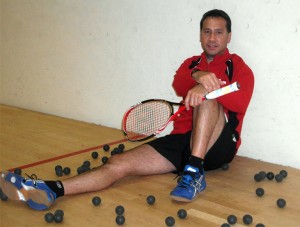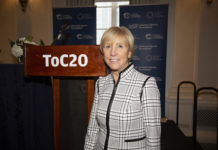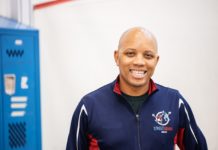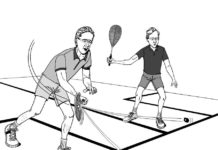Cliff Wenn, Head Pro at Maugua Club, Wellesley (MA)
Squash Magazine: Where did you grow up?
Cliff Wenn: I grew up in Calcutta, India, and lived there for 6-½ years, then moving to Singapore where my family settled for 24 years, before a final move to Kuala Lumpur, Malaysia.
S/M: How did you get involved with squash?
CW: Early on I was involved in a variety of sports ranging from soccer, tennis, badminton, table tennis, swimming and squash. I competed in tennis, soccer, and badminton while playing squash at my local club. In the end, I felt that squash was the best fit for me. Singapore was also undergoing a squash boom in the 70’s and early 80’s and had one of the highest squash court concentrations per capita in the world at the time. With the boom came an influx of foreign coaches, most from Pakistan. A little known squash fact is that Singapore had been ranked as high as No. 6 in the world.
 S/M: Did any other family member’s play?
S/M: Did any other family member’s play?
CW: Actually, I was the first in my family to pursue squash, but racket sports do run in my family. My Father was a school badminton and table tennis champion in Malaysia, and his younger brother captained the Malaysian Davis Cup team and later became the Singapore National Tennis Coach.
S/M: Who was your first teacher?
CW: My first teacher was Rahim Atan, a local Singaporean coach. I also had some coaching from Zainal Abidin, a five-time Singapore national champion, who was known as one of the most deceptive players on the tour at the time.
S/M: Did you play squash in college?
CW: When I first came to Tufts in 1982, seeing snow for the first time, I noted the narrow squash courts with oddly placed line markings and a very bouncy rock hard green squash ball. I elected to pass on hardball, instead keeping up with my softball squash and two years later, was lucky to find an excellent softball squash training partner when Malaysian National squash champion, Richard Hashim, came to Tufts. I must add that I later came to enjoy hardball squash and really wish I would have played in college.
S/M: You were a college coach, what are the biggest differences between doing that and being a club pro?
CW: While a college coach for nearly 10 years (Tufts & Wellesley), I always taught part-time as a club pro, so I was used to juggling the two roles. The most obvious big difference is as a college coach you are coaching a team, and as a club pro you are usually coaching individuals. As a college coach you have athletic department responsibilities, recruiting, fundraising, team management, travel planning, classes to teach, and your time on court will be max 2-3 hours a day. While as a club pro, much more time is actually spent on court teaching squash. I am currently the Head Pro at the Maugus Club in Wellesley (MA) where I have been teaching for the past 13 years.
S/M: The differences between coaching an adult and a junior?
CW: In general, any adult who comes for a squash lesson is there because they really want to learn squash; afterall they are paying for the lesson. With juniors, many are there because their parents want them to play squash and not of their own motivation. Adults interact more, and ask more questions, while juniors tend to participate less in the lesson and look to the pro for guidance and direction.
S/M: You own an e-commerce business, how are squash sales compared to other racket sports?
CW: Yes, I own and operate Winningrackets.com and I would say that squash sales rank 2nd to tennis with badminton coming 3rd for us as we are also quite involved with badminton as well. Our site has recently undergone a complete redesign on a new platform and will be re-launching shortly.
S/M: Among the other’s in the U.S., whom do you look to as the ideal teaching pro?
CW: I wouldn’t say that I single out any one pro as the ideal teaching pro, but I look up to all teaching pros that are career teaching pros on court teaching lessons from morning to night, day in and day out, and strive to get as many juniors involved in the sport. They are the sport’s real heroes.





